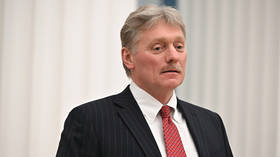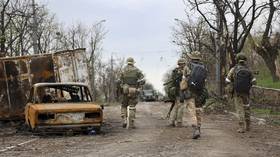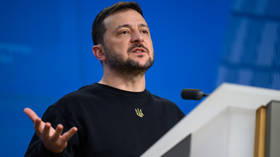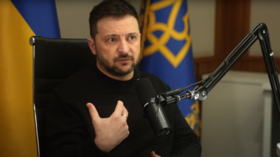Russia sends peace proposal to Ukraine

Commenting on stalled peace negotiations between Russia and Ukraine, President Vladimir Putin’s spokesperson, Dmitry Peskov, has told journalists that Moscow has forwarded to Ukraine a “draft document” with concrete wording.
“The ball is in their court, we are awaiting their response,” Peskov said on Wednesday. When asked if there was a deadline for Ukraine to respond, the official indicated that it was up to Kiev. He noted, however, that the “Ukrainians are not showing much inclination toward intensifying the negotiating process.”
On top of that, he accused Ukraine of “constantly moving away from their words, constantly changing them.” The Kremlin spokesperson concluded that this supposed lack of consistency “is having very bad consequences in terms of the negotiations’ effectiveness.”
Peskov’s remarks echo those made earlier on Wednesday by the spokeswoman for the Russian Foreign Ministry, Maria Zakharova, who said that Moscow had lost trust in the Ukrainian negotiators. Speaking to the Rossiya 24 news channel, she used a Russian proverb ‘trust, but verify’ shortening it to just ‘verify,’ “because we haven’t had any trust in these people for a long time.”
Zakharova went on to suggest that the Ukrainian government was not acting independently but was rather controlled from outside. She described the “Kiev regime’s” handling of the talks as a “circus,” saying that the Ukrainian authorities kept changing their position. Moreover, Zakharova suggested that Kiev’s participation in the negotiations could be nothing more than a diversionary tactic. She added, however, that Moscow was “ready for that,” having seen where the Minsk agreement ended up.
Since the start of the military conflict on February 24, Russia and Ukraine have held several rounds of both face-to-face and virtual talks aimed at resolving the crisis. March 29 was the last time when the two negotiating teams met in person. On April 12, Russian President Vladimir Putin said that the talks had reached deadlock. He explained that Ukraine had refused to fulfill some of Russia’s key requests - to recognize Crimea as Russian and the Donbass republics as independent.
Putin’s remarks followed an announcement by Foreign Minister Sergey Lavrov that Kiev had submitted new written proposals that deviated from what had been offered during the in-person talks. The new proposal, according to Lavrov, failed to mention that the security guarantees Kiev wanted to obtain did not cover Crimea.
Speaking during a Tuesday briefing, Ukrainian presidential adviser Alexey Arestovich warned that peace talks with Moscow could be halted should Russian troops seize Mariupol, a strategically valuable port city on the Black Sea.
On Tuesday, Zelensky’s aide, Mikhail Podolyak revealed that there was no set date for the resumption of the talks.
At the same time, Ukrainian President Volodymyr Zelensky told CNN’s Jake Tapper in an exclusive interview in Kiev last Friday that “we must find at least some dialogue with Russia.”
A peace agreement with Russia might consist of two separate documents that would cover the two key issues – security guarantees for Kiev and its future relations with Moscow, Zelensky revealed the next day. Speaking to Ukrainian media, he claimed that the Kremlin would like to have one comprehensive document that would address all the issues. However, because the security guarantees involve other countries, two documents could be a solution, he said.
Obtaining security guarantees from world powers has been named by Kiev as a key condition for agreeing to a neutral status and abandoning its ambitions to join NATO.
Russia attacked the neighboring state in late February, following Ukraine’s failure to implement the terms of the Minsk agreements, first signed in 2014, and Moscow’s eventual recognition of the Donbass republics of Donetsk and Lugansk. The German and French brokered protocols were designed to give the breakaway regions special status within the Ukrainian state.
The Kremlin has since demanded that Ukraine officially declare itself a neutral country that will never join the US-led NATO military bloc. Kiev insists the Russian offensive was completely unprovoked and has denied claims it was planning to retake the two republics by force.













